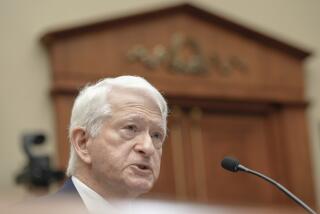Rubin Eyeing Developments in Prayer Case
- Share via
Suspected terrorist Irv Rubin has changed the way they pray in Burbank.
A significant legal fight is brewing between the foothill community and Rubin, one of two militant Jewish Defense League leaders whom a federal grand jury indicted this month on charges of plotting to bomb a Culver City mosque and a congressman’s office.
The legal dispute, unrelated to that case, has to do with prayer at City Council meetings. It arose during a meeting in November 1999, when a minister delivered a prayer invoking the name of Jesus Christ. Rubin filed a lawsuit alleging that the religious reference was unconstitutional.
A year ago, a Los Angeles trial judge ruling in that case ordered Burbank to stop sectarian prayer--that which reflects a specific religion’s beliefs--before council meetings.
Since then, the council has begun each meeting with a nondenominational invocation. In addition, the agenda now warns that sectarian prayer has been deemed unconstitutional.
Burbank officials are complying with the court’s judgment while they appeal the ruling. But they say they cannot legally censor the viewpoint of the clergy who volunteer to lead the invocation, including those who call on Jesus Christ.
“To me, it’s a free-speech issue,” Mayor Bob Kramer said. “When a minister or a rabbi comes to a meeting, is it our job to tell them how to pray?”
Both sides agree that the case raises important constitutional questions. Burbank leaders say the issue is free speech. Rubin, co-plaintiff Roberto Alejandro Gandara--who is Christian--and their attorney Roger Jon Diamond, however, say that invoking Christ’s name in prayer at a council meeting shows a preference for one religion over another and violates the Constitution’s prohibition against the establishment of religion.
A hearing date in the 2nd District Court of Appeal has not been set.
Unlike school prayer cases, the U.S. Supreme Court in 1983 cited tradition in upholding the constitutionality of an opening invocation at legislative sessions. The case, Marsh vs. Chambers, is the only one on legislative prayer to come before the Supreme Court.
The court distinguished between school and legislative prayer, saying that adult lawmakers are less susceptible to religious indoctrination or peer pressure.
But Rubin and Burbank officials disagree over whether the Supreme Court decision addressed the type of prayer allowed, or whether it had to be nondenominational.
He contends that it bars sectarian prayer. Burbank officials say it permits all prayer as long as it doesn’t proselytize or advance or disparage a religion.
“Burbank seems to be litigating over its ability to say a Christian prayer,” USC law professor Erwin Chemerinsky said. “If there is prayer, I think it’s important that it be secular prayer.”
The Burbank Human Relations Council agreed, encouraging the City Council to uphold the local judge’s order because nondenominational prayers allow people of all faiths to say “amen.”
Following a tradition that began in 1953, members of the Burbank Ministerial Assn. have volunteered to deliver prayers at the council meetings. Before the court ruling, about 20% mentioned Christ in their prayers, according to testimony in Los Angeles Superior Court two years ago.
It was David King’s turn Nov. 23, 1999. The Mormon bishop led a 67-second prayer ending with “in the name of Jesus Christ.”
“When people pray, they should pray in the manner they’re accustomed to” whether they adhere to a Christian, Jewish, Muslim or other faith, King said. “It’s about tolerance. The sincerity of the prayer is what’s important.”
He’s still baffled by the uproar over his prayer. “Nobody complained before,” King said. “But look at who’s raising the objection. I don’t have to tell you about Irv Rubin.”
Rubin attended the council meeting to oppose Burbank Airport expansion.
After a judge ruled in his favor, Rubin told The Times, “Sectarian prayer elevates one religion over another.”
Rubin did not seek monetary damages, Diamond said.
Since then, some members of the ministerial association have declined to lead the invocation, city officials said.
Rubin has followed the appeals process while confined in the Los Angeles federal detention center awaiting his arraignment today, his attorney added.
Interest in the prayer case runs the gamut. The atheist Council for Secular Humanism has asked the appellate court to ban all prayer at government forums.
They argue that just as non-Christians may feel alienated by Christian prayer, atheists will seem like outsiders when a generic prayer is offered.
An attorney for 34 California cities that begin their meetings with prayer said the court-imposed resolution is unworkable.
“The judge requires each member of the City Council to parse the content of a particular prayer” to determine if it is secular, T. Peter Pierce said.
UCLA law professor Eugene Volokh predicts that the trial court decision will be overturned. He said the test should not be whether the prayer is sectarian.
It is “a difficult distinction” for lawmakers to apply, Volokh said, and “courts traditionally are reluctant to get into that.”
More to Read
Sign up for Essential California
The most important California stories and recommendations in your inbox every morning.
You may occasionally receive promotional content from the Los Angeles Times.










